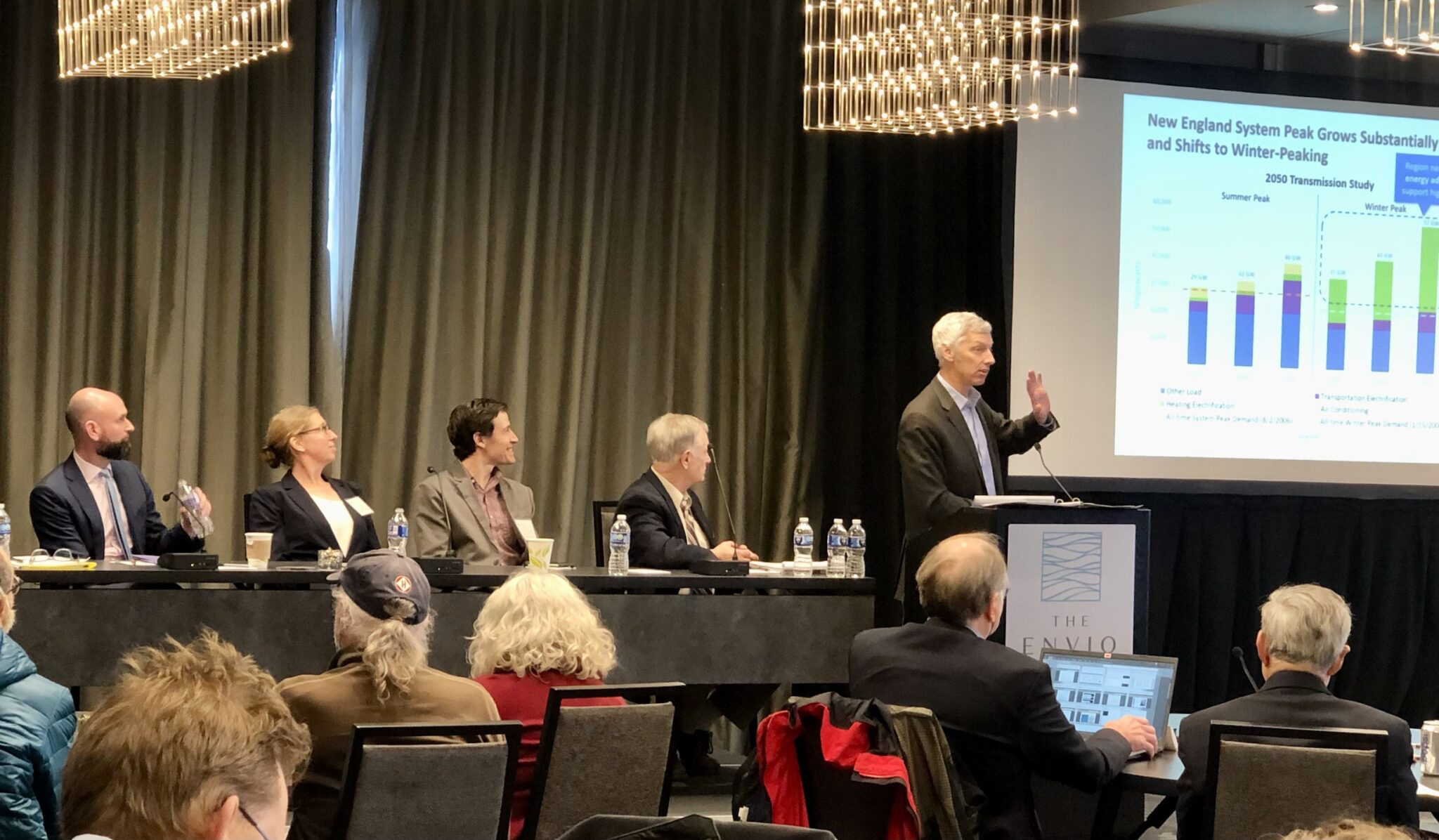The region’s electric grid operator made a visit to Portsmouth last week to discuss its role in a clean energy future. What exactly that is was the question at hand.
ISO New England is the nonprofit entity that oversees the operation of the region’s bulk power system and administers wholesale electricity markets. It frequently takes hits from the clean energy industry for what many perceive as a reluctance to usher more renewables onto the grid and assist states in meeting their decarbonization and climate-related goals.

Robert Ethier of ISO New England talks to attendees during a March 30 panel discussion on the future of clean energy at the AC Hotel in Portsmouth. (Hadley Barndollar/New Hampshire Bulletin)
At the Thursday, March 30, meeting, ISO New England told attendees it’s not the problem.
“I don’t feel we are the holdup,” said Robert Ethier, vice president of system planning at ISO New England. “There are a lot of resources that, for various reasons, whether it be siting or finance, they are not under development yet. We also, like you, are waiting for them to get built. Frankly, we can’t wait for that future.”
The grid operator met with the public for its Consumer Liaison Group’s quarterly meeting, which is held in a different New England location each time. The Consumer Liaison Group is made up of representatives from all six New England states, intended to serve as a conduit between ratepayers and ISO New England.
New Hampshire’s representation on the CLG includes Consumer Advocate Donald Kreis, climate activist Rev. Kendra Ford and energy adviser August Fromuth.
At ISO New England’s latest forward capacity auction — an auction that secures enough resources to meet electricity demand for the next three years — solar, wind, battery storage and demand resources accounted for 16 percent of all capacity, which the grid operator says is indicative of the energy transition in action.
“We have seen a lot more participation of renewables in the capacity market, and we do anticipate that trend growing,” said Anne George, vice president of external affairs and corporate communications for ISO New England.
The auction was also the first time the coal-fired Merrimack Station in Bow, the last of its kind in New England, failed to qualify, signaling the coming end of coal in the region.
George explained ISO New England’s interconnection queue, where energy resources submit applications to be studied for potential future connection to the electricity grid. While natural gas used to make up the largest portion, George said, “now it is virtually all” wind, solar and battery.
‘We don’t have unlimited time’
Panelists both traded barbs and found common ground while discussing the clean energy future, specifically as it relates to New Hampshire. Kreis welcomed attendees to the “regional pariah,” the only state in New England without decarbonization goals in place.
State Rep. Michael Harrington, a Strafford Republican who serves on the House Science, Technology, and Energy Committee, called himself a “climate realist” who “takes a more practical point of view.” In several instances, he told attendees, “the world’s not going to end.”
More renewables are going to be built, Harrington said, but he expressed skepticism for the emerging energy sources, detailing lengthy timelines for approving wind projects, for example. He said natural gas will continue to serve the purpose of reliability in the region, and “we are going to have to use fossil fuels.”
Other panelists did agree with Harrington’s opinion that energy facility siting is going to be a “major problem” moving forward. He specifically referenced the failed Northern Pass and CMP Corridor projects in New Hampshire and Maine.
“No matter what type of project you build, it’s going to take up room,” he said. “People are going to fight that tooth and nail.”
Sam Evans-Brown, executive director of Clean Energy NH, said in order for the clean energy transition to be successful, it has to be affordable, low-emitting, reliable and resilient.
But the Granite State isn’t showing much momentum.
“New Hampshire increasingly finds itself surrounded by states going full gas on renewable energy,” he said. “From where I sit, I see states that are locking into long-term procurement of electricity with fixed costs. Those resources that come online are going to start to sell into the regional market … pretty soon we’re going to be missing the boat.”
Susan Muller, senior energy analyst for the Union of Concerned Scientists, approached the climate change angle, telling attendees the energy transition is a “response to things that are happening in the real world.”
She said ISO New England recognizes that, but what it isn’t recognizing is the “time constraint.”
“There’s a lot of good news and a lot to be positive about,” Muller said, “but we don’t have unlimited time to get this done.”
Carbon pricing would help get the transition done more quickly, said Dan Dolan, president of the New England Power Generators Association. What he called the “best, most efficient way” to incentivize the move away from fossil fuels, a carbon pricing mechanism has only passed in one of the 12 legislative bodies across New England, he said.
He advocated for a “multi-sector meaningful price on carbon” that “links sectors and optimizes economy-wide (emissions) reduction.”
ISO New England’s Ethier closed Thursday’s panel by telling attendees “reliability is at our core.” The entity is independent of all companies competing in the energy marketplace, he said, and is mandated by the Federal Energy Regulatory Commission to be “fuel and technology neutral.”
He said ISO New England is “running a heck of a lot of studies” with the goals of accelerating toward a clean energy future. Topics of those studies include extreme weather, transmission needs, future grid reliability, and evaluating different market options to support a renewable-heavy grid.
This story was originally produced by the New Hampshire Bulletin, an independent local newsroom that allows NH Business Review and other outlets to republish its reporting.